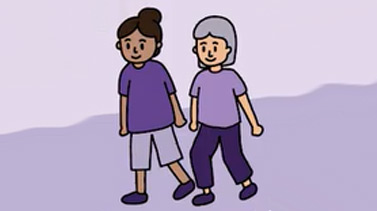Physical Activity to Decrease Fatigue after GBS
Exploring effects of activity coaching on fatigue for people with Guillain-Barré Syndrome (GBS)

Even when people have made a good recovery after GBS, up to 60-80% of people report that they continue to experience fatigue which significantly limits their every day functioning. We have recently successfully finished trialing an online activity coaching programme to see if we could address this.
In other neurological conditions, there is evidence that regular physical activity can reduce fatigue, however the application of this research to GBS is less clear. There is some evidence that aerobic training is effective in increasing physical fitness for people with GBS however none of the studies published to date have focused on changing persistent fatigue in individuals who have reached their expected recovery. Previous studies have used supervised exercise sessions in tertiary care centres, which is often both impracticable for people with GBS and does not address the sustained behaviour change needed to form lifelong physical activity habits. In the context of the Covid-19 pandemic when this project was concieved, telerehabilitation was the preferred mode of delivery to limit transmission, but it also had the advantage of being able to reach rural populations more easily than traditional forms of delivery that involve face to face contact.
We designed a limited contact (maximum of 6 hours) telerehabilitation (all contact made by phone and/or videoconferencing) intervention based on behavioural change principles. A physiotherapist customised the intervention based on each participant’s goals and their contextual factors (eg their level of fatigue, current fitness level, resources and support available). The physiotherapist met (remotely) with each participant weekly and used relevant behavioural change techniques from a menu of options .
We used a single system design to investigate the effectiveness of the intervention to reduce fatigue in 8 people who had had a diagnosis of GBS more than two years previously and were still experiencing the effects of fatigue. We also explored participants' perspectives of acceptability and feasibility of the intervention through qualitative interviews. The intervention was found to be acceptable, feasible and effective. The findings are extremely likely to be relevant to other neurological conditions where fatigue is a significant and persistent factor.
Formal findings have been submitted for publication, and a summary can be found here [ink pending]. However, one of the incidental learnings from this work was that participants told us how little they knew about fatigue in GBS and how they might begin to manage it. So we have developed a web page and printable flyer presenting information informed by the study and by the participants that worked with us. These are currently being hosted by the GBS Support group NZ Trust and a copy of the printable version can be found below.
For more information, you can email Suzie at Suzie.mudge@aut.ac.nz, or call Greta on 09 921 9999 ext 7676 , email great.smith@aut.ac.nz .
Resources related to this project
- Publication
A personalised activity programme helps reduce fatigue in people after Guillain-Barré Syndrome in a replicated single system design
S Mudge, G Smith, GJ Parry
Disability and Rehabilitation, 1-13 - Flyer - Managing Fatigue in Guillain - Barré Syndrome
- Fatigue management video - Fatigue after GBS
- Link to the Guilain Barré - Syndrome Support Group NZ Trust Website - GBS | How You Can Manage Fatigue | GBS (gbsnz.org.nz)
Project details
Funders:
Neuromuscular Research Foundation; AUT Faculty Research Development Fund
Principal investigator:
Dr Suzie Mudge
Research team:
Dr Suzie Mudge, Dr Gareth Parry, Greta Smith
Contact:
greta.smith@aut.ac.nz
Timeline:
May 2001 – December 2022
Current status: Recruiting